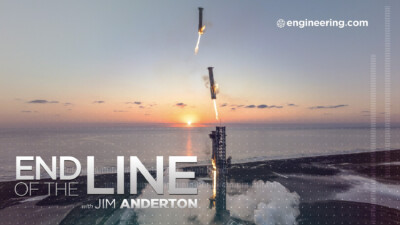Nuclear micro reactors are workable, scalable and affordable. Why is no one talking about them?
Episode Summary:
Nuclear energy has many, many detractors but one fact that no one disputes is that it’s capable of producing a lot of electricity and a lot of process heat without CO2 emissions. A new generation of extremely small, road and even air transportable micro reactors promise to take the key benefits of nuclear and add flexibility and reliability as well as considerable redundancy to global power grids. Yet few have heard of them, and progress in development is only now picking up speed. Why is such a workable technology been ignored for so long?
Access all episodes of End of the Line on Engineering TV along with all of our other series.
Transcript of this week’s show:
To see any images, graphs, charts, graphics, and/or videos to which the transcript may be referring, watch the above video.
The UN climate change conference in Glasgow is underway and like all major gatherings where politicians are attempting to do what engineers can do better, very little will be accomplished in the end. Why? Because politicians and economists, like all craftspeople, know what they know and use the tools at their disposal to get the outcomes they want. Politicians and economists attempt to use the tools of legislation and money to allocate resources into areas that generate the results they want, in this case a decarbonized global energy system. Will it work? Probably not, and if it does, it will do so at excessive cost and over a much longer time than would be necessary if experts handled the problem.
One solution that I expect no one in Scotland to talk about is nuclear micro reactors. Nuclear could have been the solution to CO2 long before anyone was aware of the problem, but for 50 years the same environmentalists who are driving the global warming agenda fought long and hard to stop the technology. This made sure that the world’s energy system was fuelled by petroleum. And as a result, even if they change their tune, the large-scale civil engineering projects that we call nuclear power plants simply can’t be built in large enough numbers fast enough to hit any realistic CO2 reduction targets. But that doesn’t mean that nuclear won’t work.
Quite the contrary in fact, with a new generation of micro nuclear reactors that use fundamentally different operating principles from the traditional water and movable rod moderator designs. I won’t go into the technical details here, and they are fascinating, but the key takeaway is that these new fission reactors are intrinsically safe. That means that they don’t need highly redundant safety systems or emergency procedures to be made safe in the event of a problem, and don’t need the heavy concrete and steel containment structures to contain radionuclides the way conventional reactors do.
Better yet, they’re scalable, in the other direction, meaning they can be made small enough to be air transportable or truck called in a form factor similar to a shipping container. With outputs on the order single-digit megawatts, the small units can be used almost anywhere, from the Arctic to remote communities to natural disaster zones in an emergency. They can run for up to a decade with minimal maintenance, and at the end of their life are small and light enough to be buried deep in stable geological formations.
Compared to CO2 capture and sequestration, or conventional alternates like wind and solar, micro reactors have the advantage of working anywhere, anytime. And most importantly, their form factor means that they are mass producible, on assembly line principles. Which means that standard engineering economics apply increased volume means lower unit cost. So why does this excellent solution receive so little attention compared to grid scale and residential solar photovoltaic and wind energy?
In my opinion it’s because the same politically motivated people that are driving the CO2 agenda are the people that hobbled the nuclear industry in the 70s and 80s. And their lack of engineering knowledge and other, more questionable political considerations means that they must throw shade on anything related to atomic energy. Engineering is about finding the most reliable, cost-effective solution to any problem. Environmentalism as we currently see it demands neither of those things. Micro reactors, mass-produced with auto assembly line principles, might be the key to energy in the 21st century. If politicians start listening to engineers.



